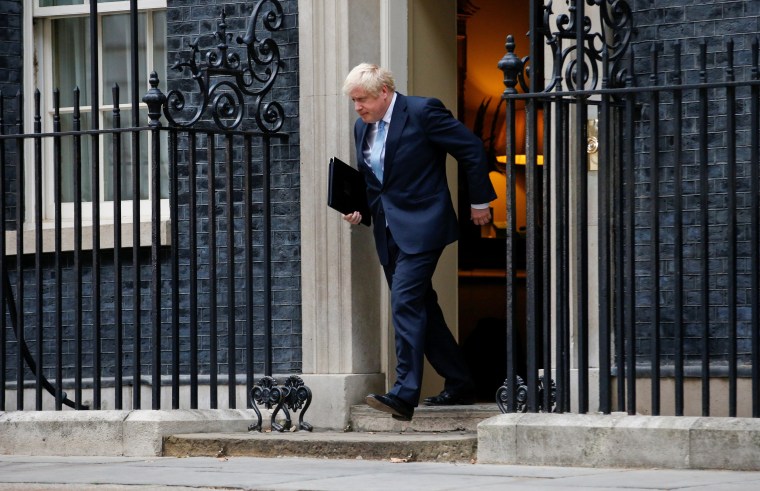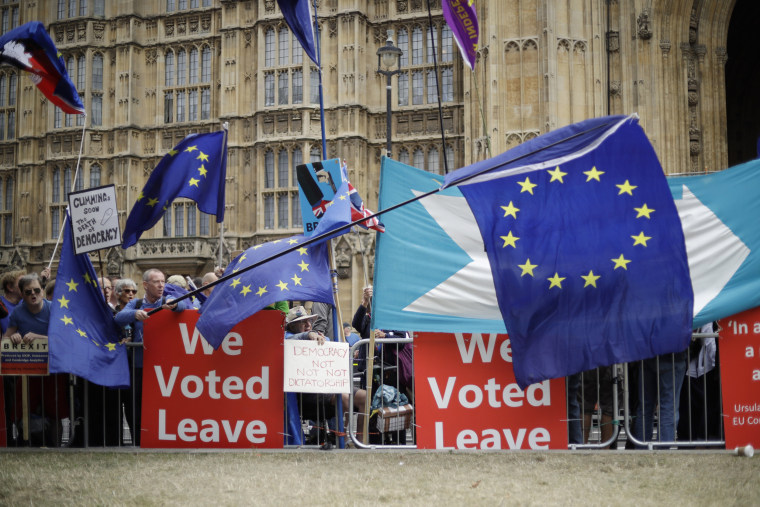LONDON — Rebellious British lawmakers have launched an audacious bid to stop the U.K. from leaving the European Union by the deadline of Oct. 31 without a deal.
Just six weeks into his tenure at No. 10 Downing St., Prime Minister Boris Johnson has staked his reputation on making Brexit "do or die" next month after two previous deadlines were missed amid growing dissent in Parliament and political polarization across the country.

In a sign of both the high stakes of the move and the emotions involved, Johnson lost his working majority in Parliament as he addressed the chamber Tuesday.
Phillip Lee, a member of Parliament for Bracknell, which is west of London, stood up and walked from the Conservative benches to the rival pro-European Liberal Democrat Party ones. Lee said in a statement that Johnson's Brexit stance was "putting lives and livelihoods at risk."
Lee's move will not cause Johnson to lose his job. Still, it comes at a crucial juncture for U.K. and European politics, as a coalition of Conservative lawmakers and opposition party members got set to propose a motion in the House of Commons on Tuesday to stop Johnson's Brexit plans.
The pound hit a two-year low against the dollar on Tuesday as markets reacted to the growing possibility of the most extreme Brexit outcome and the likelihood of an election, slumping to $1.19 to the dollar. On the eve of the Brexit referendum in June 2016 the pound was at around $1.50.
Some experts have warned that leaving without an agreement ensuring some sort of legal and regulatory continuity — a "no deal" Brexit — would devastate the economy.
Philip Hammond, a senior Cabinet minister under then-Prime Minister Theresa May and an outspoken opponent of Johnson's Brexit stance, told the BBC Tuesday morning that there were enough rebels to take control and block Brexit temporarily.
"I am going to defend my party against incomers, entryists, who are trying to turn it from a broad church to narrow faction," he said, referring to a recent influx of die-hard pro-Brexit supporters who have swelled the Conservatives ranks.
"People who are at the heart of this government, who are probably not even members of the Conservative Party, who care nothing about the future of the Conservative Party, I intend to defend my party against them," he added, in apparent reference to Dominic Cummings— a senior aide to Johnson and a key figure in the Brexit movement.
The motion will be debated on Tuesday evening, and if it passes the government will cede control of the parliamentary agenda to lawmakers. The power to decide which bills are to be voted on is key as different factions try to win control over the legislative process and the country's approach to Brexit.
The vote is expected to be close.
Johnson's party now has no majority in the House of Commons, and so far at least 15 Conservatives have publicly committed to voting against the government. Johnson has said any Conservatives who do so would be expelled from the party.
"I don’t think unprecedented is too strong a word. It is huge," said Tim Bale, politics professor at Queen Mary University of London. "The legislature actually mandating the actions in foreign policy of the U.K. prime minister — that’s certainly not something we’ve seen before in parliamentary history."
If Johnson loses, his government is widely expected to call for a snap general election in October, before the Brexit deadline, in an attempt to win a mandate for a "no deal" Brexit.
Should he then lose an election, Johnson would become the country's shortest-serving prime minister.
However, the government needs two-thirds of members of Parliament to agree to an election — and with the opposition Labour Party trailing in the polls, some Labour figures have cautioned against backing it. Former Labour leader Tony Blair called an October election an "elephant trap" that Labour should avoid.
Signaling the worsening state of the civil war in the governing party, former Cabinet minister Justine Greening, another vocal critic of a "no deal" Brexit, said she would not run as a Conservative again.
Meanwhile, Westminster was briefly distracted Monday by the arrival of a new resident at 10 Downing Street — not a new prime minister, but a 15-week-old rescued Jack Russell-cross puppy called Dilyn.
It is not known what this development means for Number 10's current four-legged inhabitant, Larry the Cat, who is "Chief Mouser" to the Cabinet Office.

